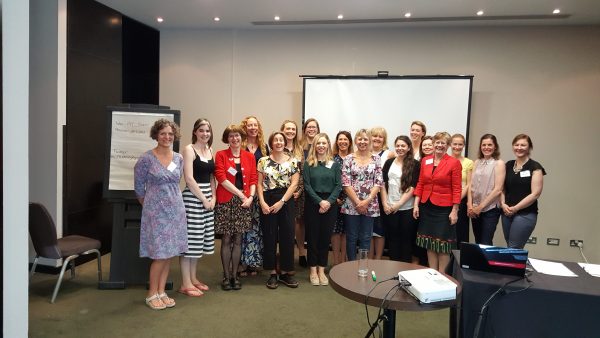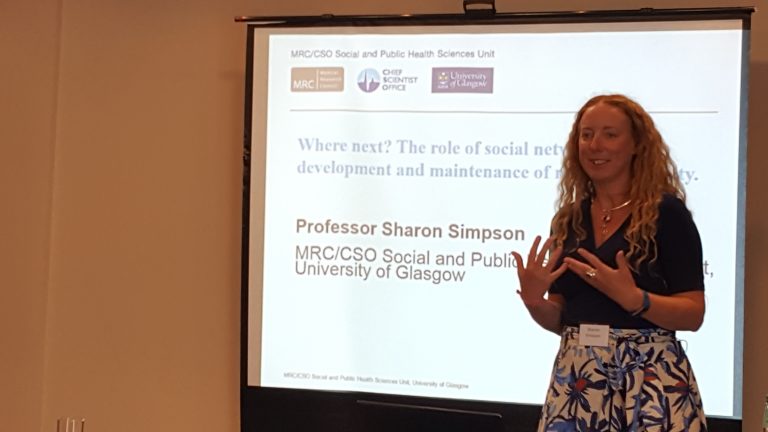PRAM Study Dissemination Event
22 May 2018
The PRAM Study Dissemination Event
As part of the dissemination of our study findings on 15 May 2018 in Park Plaza, the PRAM team welcomed 19 researchers and practitioners from across the UK to a research day on obesity in pregnancy and the post-natal period at the Park Plaza in Cardiff.
PRAM is a feasibility study of the use of individualised weight charts for weight monitoring in pregnancy funded by the Burdett Trust for Nursing, run through Centre for Trials Research and the School of Healthcare Sciences Cardiff University. The team is led by Professor Julia Sanders and includes Elinor Coulman, Rebecca Cannings-John, Mandy Isles, Sue Channon, Cheney Drew, Bethan Philips, Billie Hunter and Lucie Warren. Cardiff & Vale University Health Board was the PRAM study site where it was co-ordinated by midwives Helen Davies and Sarah Northam.
Julia Sanders Opens

Julia opened with a broad outline of the aims of the day: we wanted to bring researchers working in the area together and to have a whistle-stop tour around the different research projects taking place in the four home nations, providing an opportunity to form new collaborations and develop ideas about the research priorities for the future.
Diverse Presentations

There was a really diverse range of presentations covering many different aspects of obesity in the pre, during and post pregnancy periods. Looking at the preconception phase, Laura McGowan (Queens, Belfast) presented work on men and womens’ views of health practices before trying for a baby and Laura highlighted a recent Lancet series that brings together the work in the pre-conception period; There were three presentations looking specifically at interventions during pregnancy to reduce weight gain: PRAM which included women across the weight categories and introduced individualised weight charts to self-monitor weight gain; Dunla Gallagher (Cardiff) described the Healthy Eating and Lifestyle in Pregnancy Trial (HELP) and her two year follow-up of mother and child outcomes and Annie Anderson (Dundee) presented ‘optiMUM’, an embedded midwife delivered weight management intervention, both of which were for obese pregnant women.
Post-Partum Period

The post-partum period was the focus for Debbie Smith (Manchester University/ Leeds Trinity) who used qualitative methodology to explore the breastfeeding behaviours of women with BMI over 30 and Michelle McKinley (Queens University, Belfast) who described a text message intervention to support postpartum weight management in the Supporting MumS pilot study (SMS). Elinor Olander (City University) presented her recent work with young women under 20 and how to support them to eat healthily and keep active during and after pregnancy. Rachel Rowe (NPEU, Oxford) presented results of the UKMidSS study into intrapartum related risks for severely obese women planning births in alongside Midwifery Led Units. Ewelina Rogozinska (Queen Marys London) is conducting an individual patient data meta-analysis of randomised trials to increase our understanding of the findings of over 100 RCTS on the effects of diet and lifestyle interventions in pregnancy.
Where Next?

Sharon Simpson (Glasgow University) rounded off the presentations with her reflections on an area she believes has been neglected in studies so far which is the impact of social networks on individual’s behaviour and how we may be able to harness the social network to support change.
Group Discussion

The latter part of the day was spent in group discussion, drawing out the themes and thinking about where next in terms of research. Some of the studies highlighted difficulties with fidelity and weight monitoring by midwives which raised the issue of role responsibility and whether there are others such as healthcare assistants who might be better placed to work with women. The ideas around care pathways, developing a suite of interventions, avoiding the “one size fits all” and the role of social networks were explored. The “total environment” idea that is currently being studied is an exciting development so we will watch the findings of that with interest. In terms of research methods, the importance of process evaluations was underlined and opportunities to co-produce interventions with women could be one way forward to help us think more creatively about what might make a difference.
It was a great day, learning from colleagues from a wide range of disciplines all of whom have been working in the same area, coming up against similar challenges. Everyone shared their work with a real sense of openness and collaboration.
Many of the talks were presenting new unpublished work and so no “findings” will be disseminated but the group will continue as an informal network.
Thanks from the PRAM team to everyone who came and made it such a productive and enjoyable day
#CTRObesityPregnancy
- June 2024
- May 2024
- April 2024
- March 2024
- December 2023
- November 2023
- September 2023
- July 2023
- June 2023
- April 2023
- March 2023
- February 2023
- December 2022
- November 2022
- October 2022
- September 2022
- August 2022
- July 2022
- June 2022
- May 2022
- April 2022
- March 2022
- February 2022
- January 2022
- November 2021
- September 2021
- July 2021
- June 2021
- May 2021
- March 2021
- February 2021
- December 2020
- November 2020
- September 2020
- August 2020
- July 2020
- January 2020
- December 2019
- October 2019
- September 2019
- July 2019
- June 2019
- May 2019
- April 2019
- February 2019
- December 2018
- November 2018
- October 2018
- September 2018
- August 2018
- July 2018
- June 2018
- May 2018
- April 2018
- March 2018
- December 2017
- October 2017
- August 2017
- July 2017
- June 2017
- May 2017
- April 2017
- March 2017
- February 2017
- January 2017
- December 2016
- October 2016
- August 2016
- June 2016
- April 2016
- March 2016
- February 2016